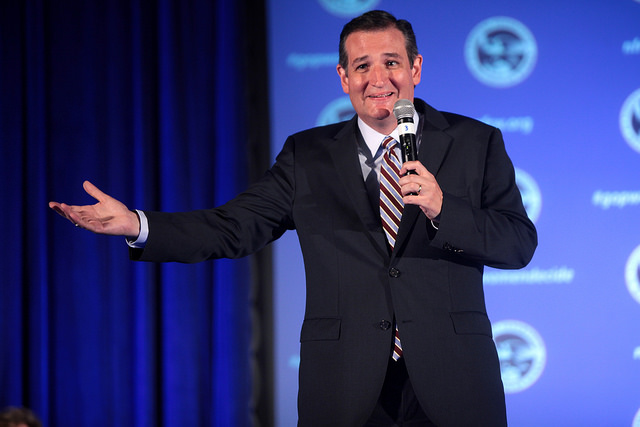
Senator Ted Cruz unexpectedly won over Donald Trump in the Iowa Caucus.
Photo courtesy of Gage Skidmore (Flickr).
With the Iowa Caucuses having taken place on Monday, Feb. 1, it is safe to say that we have a better idea of who will make waves this electoral season. The first major event leading to the presidential elections in November managed to have outcomes we expected, as well as a bump in the road for one major candidate.
On the GOP side of things, Texas Senator Ted Cruz defeated media sensation Donald Trump by 3.3 percent. The Democratic caucus played out in more predictable fashion, with former Secretary of State Hillary Clinton narrowly edging out Vermont Senator Bernie Sanders by just 0.3 percent.
While the victory gives Hillary Clinton and Cruz some momentum going forward, the Iowa Caucuses are a mixed bag for party nominations, as Iowa caucus winners have gone on to lose their party’s nomination.
In the past, Jimmy Carter, Ronald Reagan, George H. W. Bush and Bill Clinton all lost the Iowa caucus, but ended up winning their party’s nomination and the support of the nation. In more recent examples, Mitt Romney and John McCain both went on to win the Republican nomination after they lost the Iowa Caucus. While Romney did lose a very narrow race to Rick Santorum in 2012, McCain was in third place at the 2008 caucus.
If anything, the electoral event has the capability to derail the momentum of certain political front-runners and slingshot other candidates to nomination. For example, before the 2004 Iowa caucus, Senator John Kerry found himself behind in the national polls. Kerry’s momentum only began to take off after he attained his own upset victory in Iowa. The 2004 Iowa Caucus was the platform that led Kerry to the front of the national polls with 47 percent of support and eventually led to him winning the Democratic nomination.
Back in 2008, current Democratic candidate Hillary Clinton fell on the opposite end of the spectrum in terms of how the Iowa Caucus could affect a candidate’s momentum. All throughout 2007, Clinton was viewed by the public as the undisputed front-runner to win not just the Democratic nomination, but the election as well. Yet, her front-runner status came to a crashing halt in January 2008 when Clinton ranked third place in the Iowa Caucus. Though she would keep fighting for the following several months, it was never the same after Iowa. Barack Obama took the lead in the races and never looked back. One caucus managed to take Clinton from surefire winner to being left in the dust.
This is why the Caucuses are some of the most important electoral events to look at when understanding how the presidential elections might play out, despite the fact that Iowa does not always predict the winner. Before the event, Trump walked in the clear front-runner to win his party’s caucus the same way Clinton did in 2008. Now, with the narrow loss to Cruz, the seemingly unstoppable political force has found himself momentarily halted. History does have a tendency to repeat itself after all, but it is just as capable of subverting all expectations.
The point to take away is that just because Clinton and Cruz scored a significant victory in Iowa does not mean anything is set in stone yet. The Iowa Caucus only begins the final stretch of the journey for these presidential hopefuls. A long list of primaries are coming up and anything can happen over the next several months.
Yet, in the midst of the wild storm that is our presidential elections, the Iowa Caucus have given the voting public an early forecast as to who will have a fighting chance in this year’s race to the White House.


